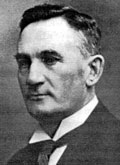Frank Fahy was educated at the Royal University, Galway. In 1901, he took up teaching and later he became secretary of the Tralee branch of the Gaelic League. Fahy joined the Irish Volunteers in 1913. He participated in the Easter Rising of 1916, and was sentenced to ten years' penal servitude. Released in 1917, he returned to Ireland where he resumed his occupation as teacher, though he still pursued his activities in the Sinn Féin movement. He was elected a Member of Parliament in the General Election in December 1918, but was arrested in the "Gennan Plot" and deported. Released in 1919, he subsequently avoided arrest until the Truce of 1921. Fahy opposed the Anglo-Irish Treaty and left the Dáil with Eamon de Valera. He did not return to the Dáil until Fianna Fáil took the oath and their seats in August 1927. In the same year he became a Barrister of the King's Inns, Dublin. After the General Election in 1932, Fianna Fáil became the largest parliamentary party and Fahy was elected Chairman of Dáil Éireann in the place of Michael Hayes. He continued to hold that position until 1951, when because of ill-health, he did not seek reelection to the Chair. In 1937-1938 he was a member of the Commission, acting as a collective head of state before the first President of Ireland, Douglas Hyde, took the oath of office on 25 Jun 1938. Biography source: [2] |

